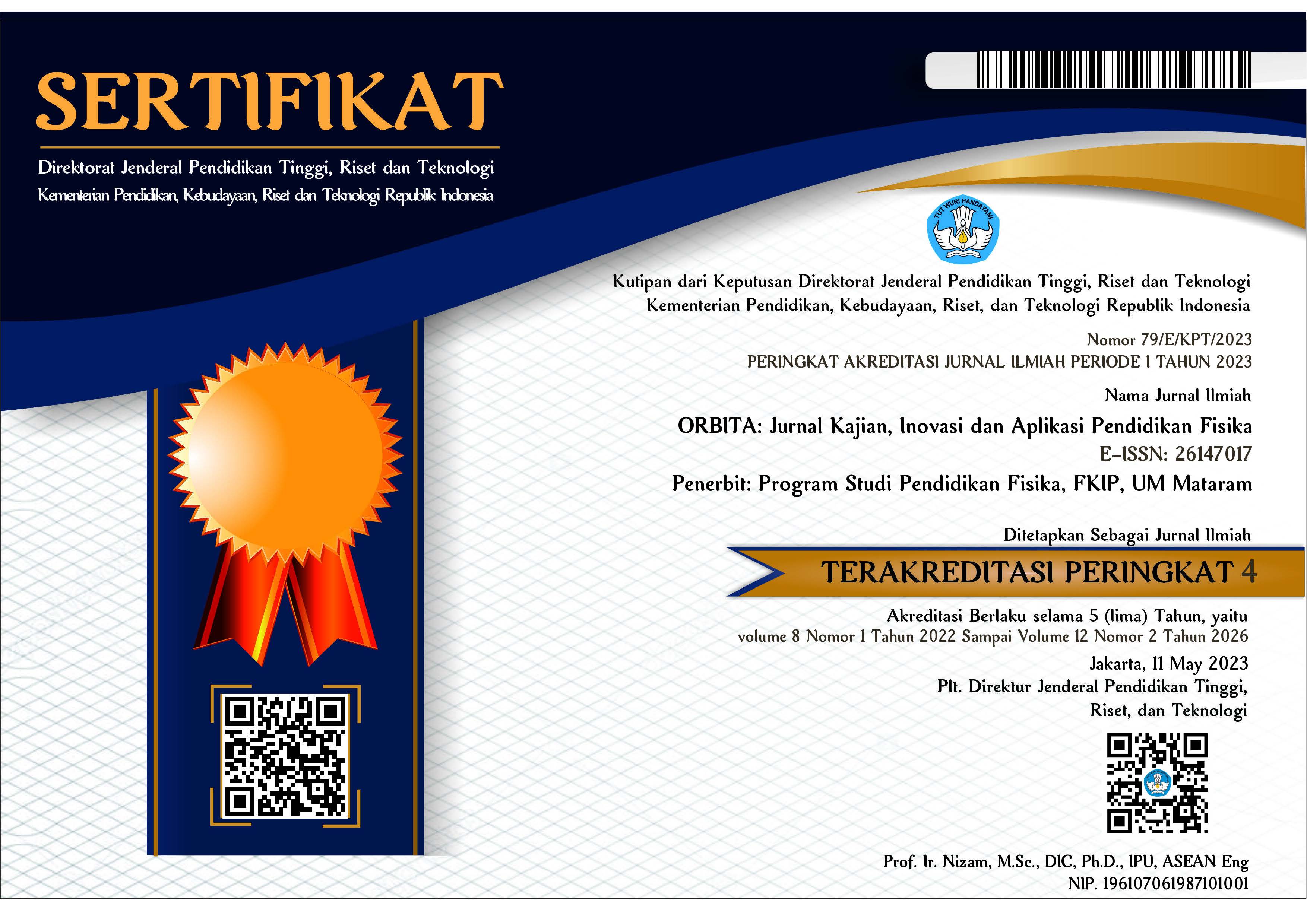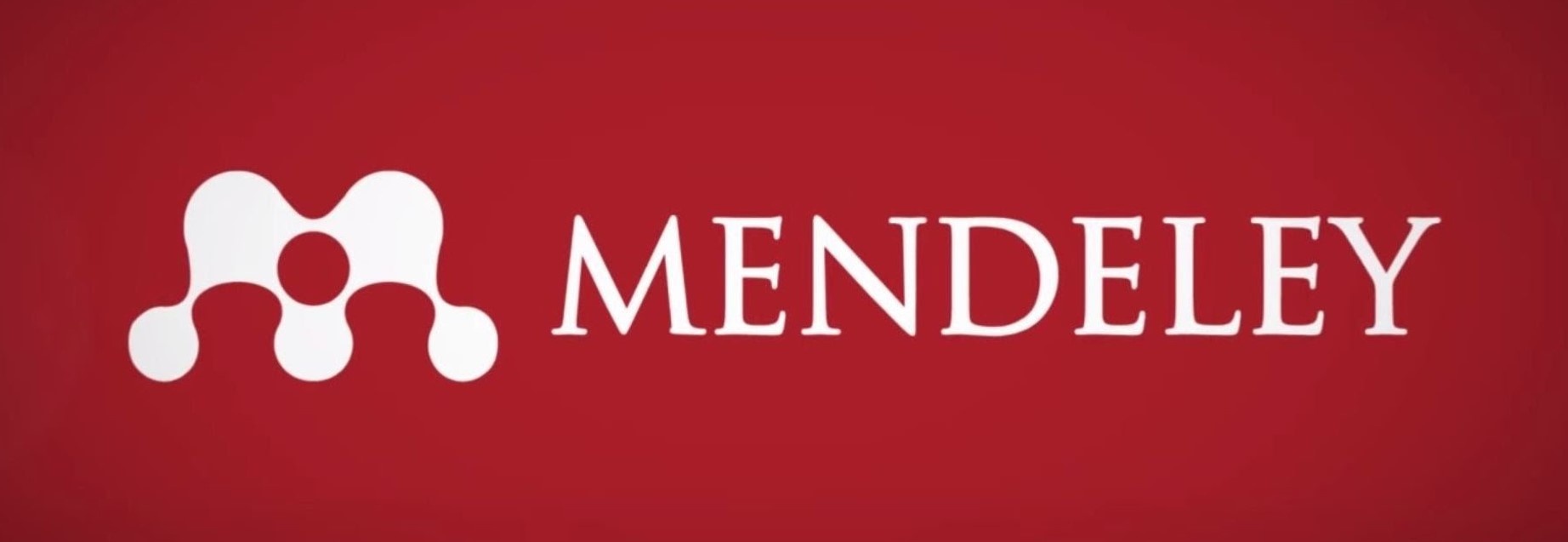- Focus and Scope
- Section Policies
- Peer Review Process
- Open Access Policy
- Archiving
- Publication Ethics
- Publication Frequency
- Author Fees
- Jurnal History
- Plagiarism Policy
- Guide for Reviewer
- Agreement and Declaration
Focus and Scope
ORBITA: Jurnal Pendidikan dan Ilmu Fisika invites and welcomes the submission of advanced research and review papers, innovations and developed selected conference papers that have never been previously published. This journal provides publications and a forum to the academics, scholars and advanced level students for exchanging significant information and productive ideas associated with all disciplines in the field of physics and education physics (learning physics in early education, primary and secondary education, and higher education)
The relevant topics of the latest progressive findings or developments will be taken seriously into consideration, the topics covered by the journals include: learning methods development; learning media development; learning models, and approaches implementation; Etnophysics (learning models by considering local wisdom and being enriched with the principle of religion and culture); literature study (meta analysis, and systematic literature review); and several several application of physics (current issue of applied physics).
Section Policies
Articles
Peer Review Process
The manuscript submitted to this online journal will be sent to at least two anonymous referees for contribution, originality, relevance, and presentation (double-blind review). Reviewers' comments are then sent to the corresponding author for necessary actions and responses. The Editor shall inform you of the results of the review as soon as possible, hopefully in 30 to 90 days. The submitted manuscript is first reviewed by an editor. It will be evaluated in the office, whether it is suitable for the ORBITA: Jurnal Pendidikan dan Ilmu Fisika focus and scope or has a major methodological flaw and similarity score.
The editor will run a plagiarism check using turnitin.com (Web Checker) for the submitted articles before sending it to the reviewers. We do not process any plagiarised contents. If an article has over 25% of plagiarism based on the result of the check, we will send back the article to the author to be revised for the plagiarised contents. The journal is carried out by using Mendeley as a Tool Reference Manager. The language used in this journal is English.
The accepted manuscript will be available online (free download) following the journal peer-reviewing process. The final decision of articles acceptance will be made by Editors according to Reviewers' comments. The articles sent back to the authors for revision should be returned to the editor without delay. The revised article returned later than 20 days will be considered as new submissions. The revised article can be sent to the editorial through the Online Submission Interface.
All articles published in Open Access will be immediately and permanently free for everyone to read and download. We are continuously working with our author communities to select the best choice of license options, currently being defined for this journal as Creative Commons Attribution (CC-BY).
Open Access Policy
This journal provides immediate open access to its content on the principle that making research freely available to the public supports a greater global exchange of knowledge.
Archiving
This journal utilizes the LOCKSS system to create a distributed archiving system among participating libraries and permits those libraries to create permanent archives of the journal for purposes of preservation and restoration. More...
Publication Ethics
ORBITA: Jurnal Pendidikan dan Ilmu Fisika is a peer-reviewed journal published by the University of Muhammadiyah Mataram. Available in print and online, the journal respects publication ethics and avoids any form of plagiarism. This statement explains the ethical conduct of all parties involved in publishing in this journal, including authors, editor-in-chief, editorial boards, peer reviewers and the publisher (University of Muhammadiyah Mataram). This statement is based on COPE's Best Practice Guidelines for Journal Editors.
Journal Publishing Ethics Code. Publishing in Orbita: Jurnal Kajian, Inovasi dan Aplikasi Pendidikan Fisika peer-reviewed journals is an important part of developing a coherent and respected knowledge network. It directly reflects the quality of the work of the authors and the institutions that support them. Peer-reviewed articles support and embody the scientific method. Therefore, it is important to agree on the expected standard of ethical conduct for all parties involved in publishing: authors, journal editors, peer reviewers, publishers and society.
As publishers of intellectual property, the University of Muhammadiyah Mataram takes seriously its responsibilities of guardianship at all stages of publication and we acknowledge our ethical conduct and other responsibilities. We are committed to ensuring that advertising revenue, reprints or other commercial revenue does not influence or influence editorial decisions. In addition University of Muhammadiyah Mataram and the editorial board will assist in communication with other journals and/or publishers where useful and necessary.
Publication decision. The editors of the Orbita: Jurnal Kajian, Inovasi dan Aplikasi Pendidikan Fisika decide which articles should be published. Validation of relevant work and its relevance to researchers and readers must always drive such decisions. Publishers may be guided by journal editorial boards and subject to then-current legal requirements for defamation, copyright infringement, and plagiarism. Editors may consult other editors or reviewers in making this decision.
Fair Play. Editors will always evaluate manuscripts for intellectual content regardless of the author's race, gender, sexual orientation, religious beliefs, national origin, citizenship, or political ideology.
Confidential. Editors and any editorial staff must not disclose any information about a submitted manuscript to anyone other than the relevant authors, reviewers, potential reviewers, other editorial advisors, and editors (if applicable).
Disclosure and Conflicts of Interest. Unpublished material disclosed in submissions must not be used to edit their own research without the express written consent of the authors.
Duties of Reviewers.
Contribution to Editorial Decision- Making. Peer review supports editors in making editorial decisions and can also support authors in improving articles by communicating with their editors.
Promptness. Any selected reviewer who believes that they are not qualified to review the research reported in the manuscript, or knows that reviewing the manuscript cannot be done immediately, should notify the editor and apologize during the review process.
Confidential. All manuscripts submitted for review will be treated confidentially. They may not be shown or discussed with others without the permission of the publisher.
Objectivity Criteria. The review should be done objectively. Personal criticism of the author is inappropriate. Reviewers should state their views clearly and include supporting arguments.
Acknowledgement of Sources. Reviewers should identify relevant published work not cited by the authors. Any statement of observation, derivation, or argument should be accompanied by appropriate citations. The reviewer should also alert the editor to any substantial similarities or overlaps between the manuscript in question and other published work of which he is personally aware.
Disclosure and Conflicts of Interest. Privileged information or ideas obtained through peer review must be kept confidential and not used for personal gain. Reviewers should not consider manuscripts that create a conflict of interest due to a competitive, collaborative or other relationship or affiliation with any author, company or institution related to the article.
Duties of Authors.
Reporting standards. The authors of the original research report should accurately describe the work done and discuss its significance objectively. The underlying data should be presented accurately at work. A paper should contain enough detail and references for others to reproduce the work. Fraudulent or willfully inaccurate representations constitute unethical conduct and are not acceptable.
Data Access and Retention. Authors are required to provide raw data with the article for editorial review and should be prepared to allow public access to such data when feasible (in accordance with the ALPSP-STM Statement on Data and Databases) and in any event should Retain such data for a reasonable period of time after publication.
Originality and Plagiarism. Authors should ensure that they have only written original works, and if authors have used the work and/or words of others, they should have been properly cited or cited.
Multiple, Redundant or Concurrent Publication. Authors should generally not publish manuscripts describing essentially the same research in multiple journals or first-time publications. Submitting the same manuscript to multiple journals at the same time constitutes unethical publishing practice and is not acceptable.
Acknowledgement of Sources. Proper recognition of the work of others must always be given. Authors should cite publications that were influential in determining the nature of the reported work.
Authorship of the Paper. Authorship should be limited to persons who have made significant contributions to the conception, design, conduct or interpretation of the reported research. All individuals who have made significant contributions should be considered co-authors. If others are involved in some important aspect of the research project, they should be acknowledged or listed as contributors. Corresponding authors should ensure that all appropriate and inappropriate co-authors are included in the work, and that all co-authors have seen and approved the final version of the work and agree to their submission for publication.
Disclosure and Conflicts of Interest. All authors are expected to disclose in their manuscript any financial or other material conflict of interest that may be interpreted as affecting the results or interpretation of their manuscript. All sources of financial support for the project should be disclosed.
Basic Errors in Published Work. Authors are obliged to notify journal editors or publishers immediately if they discover material errors or inaccuracies in their published work, and to cooperate with publishers in withdrawing or correcting the article.
Publication Frequency
ORBITA: Jurnal Pendidikan dan Ilmu Fisika is published twice a year, every May and November.
Author Fees
All articles published in ORBITA: Jurnal Pendidikan dan Ilmu Fisika are published in full open access. Since 2024, papers accepted after peer review will be subject to an Autor Fees of :
- Author(s) from other country : USD 0
- Author(s) from Indonesia : IDR 500.000
- Author(s) from Indonesia and other country : IDR 350.000
- The standard twelve (12) pages manuscript.
- DOI registration for each paper.
- Checking the final article similarity by Turnitin
Jurnal History
ORBITA: Jurnal Pendidikan dan Ilmu Fisika is published by Universitas Muhammadiyah Mataram. It is published twice a year, every May and November. First published in November 2015 for volume 1 number 2, November 2015.
Based on the results of the re-accreditation assessment and the assesors suggestions, it was decided that the name ORBITA: Jurnal Kajian, Inovasi, dan Aplikasi Pendidikan Fisika starting with the issue of Volume 9 Number 2, Year 2023 changed its name to ORBITA: Jurnal Pendidikan dan Ilmu Fisika. This name change is a basic effort towards journal accreditation, in addition to reflect the evolving Aims and Scope of the journal.
Plagiarism Policy
Plagiarism screening will be conducted by the editors twice. First, before the review and secondly after the review prior to publication using TURNITIN Similarity Check. Article manuscripts must obtain a similarity index of less than 25%. We will return the manuscripts to authors should the similarity index is more than 25%. Authors may rewrite the manuscripts to meet our requirements in this regard and resubmit the rewritten manuscripts. The resubmitted manuscripts will go into the new screening process, and if for any reason the similarity index is still above 25%, the editors will reject the manuscripts.
Guide for Reviewer
Guidelines for Reviewers
- Please check if the article matches your area of expertise if you feel it does not match, please contact the editor soon. Suggesting an alternative reviewer which matches the article is very much appreciated.
- Please assure you do not have conflict of interest in reviewing the article. If so, please inform the editor immediately.
- Please make sure that you have time to review the article since reviewing is a time-consuming work.
- After login to the Open Journal System (OJS) of the IJAP Journal, please accept the review request by click “will do the review". If you find problem to Login to the OJS, please contact: Mr. Zulkarnain, email: [email protected], phone/ SMS/ WA: +62878-3263-1987
- Please pay attention to the due date, which is the deadline of the review period. Please accomplish your review within the due date, but your review soon after the invitation is very much appreciated. The delay of your review decision slows down the review process, this causes waiting for author. We would be very grateful for your support to speed up the review process.
- After you accept the review request in the OJS, you will be able to download the manuscript in word type (*.docx or *.doc). Please download the file.
- Please treat the manuscript as a confidential document, do not share it to anyone else, except with the permission of Editor/s for reviewing purposes.
- Please use the Microsoft Word to comment on the manuscript using the “Review” tool.
- Kindly check the following items:
- Title. Does the title clearly describe the article?
- Abstract. Does the abstract sufficiently reflect the article? Does the article provide a novelty in the research field? Is the study important to support the knowledge in the research area?
- Introduction. Does the introduction provide enough information regarding the previous studies, the gap and the importance of the study?
- Method. Does the article present the complete information on the materials and method, so that anyone can duplicate the experiment? Does the method was appropriate to approach the problem-solving?
- Results Does the results produced from the procedures in the method section? Please be aware if any data emerges without clear information in the method section. If the data is presented in Table or Figure, please check the clarity and appropriateness of data visualization. Does the Table or Figure easily to understand and interpreted? Please also check the statistical information regarding the data. Does the data clearly explain here? Please check if any data has not been interpreted.
- Discussion. Does the author discuss the data comprehensively by referring to the results? Does the author provide sufficient citation to support or explain the results?
- Conclusion. Does the conclusion meets the study purpose/ purposes and constructed based on the results? Does it arrange simply and easy to understand as a “take home” message? Please make sure there is no any statistical statement in conclusion. If possible, please suggest for any possible further study.
- After you review, please login to the Open Journal System (OJS) of IJAP Journal, complete the “Reviewer’s Comments” and upload the file with your comments. Finally, decide the status of the article please select one from the following option.
- Accept Submission (without revision)
- Revisions Required
- Resubmit for Review
- Resubmit Elsewhere
- Decline Submission (Reject)
- After selecting the option, kindly click the “Submit Review” button.
Agreement and Declaration
The acceptance of the following terms and conditions confirms your appointment as a member of the editorial board or reviewer:
Agreement
- Members are expected to stay active and willing to complete the tasks assigned to them promptly.
- Members are expected to observe the publication ethics and malpractice policies of the journal, which may change from time to time to improve the journal's quality.
- Acceptance of your application is no guarantee that the journal’s editor will use your peer-review reports.
- Agree to be released as a reviewer after two refusals, two failures to review, or three late reviews.
- When reviewing a manuscript, please provide valuable comments and instructions to help authors, the Editor-in-Chief, and the Editorial Board to maintain a high standard of publication.
- The review should be constructive by giving careful attention to detail while at the same time respecting the intellectual independence of the author.
- The editor reserves the right to edit any comments hindering constructive discussion of the author’s manuscripts. Toward this effort, we kindly ask our reviewers to avoid comments not related to the authors’ work and so forth.
- All manuscripts submitted to Schrödinger: Journal of Physics Education are confidential documents and should not be disclosed to anyone before publication based on Schrödinger: Journal of Physics Education Intellectual rights policy.
- When you are assigned a manuscript to review, please return your comments within the time set by the editorial office. Your effort will give the author sufficient time to revise the manuscript.
- When approached to review, agree to review only if you have the necessary expertise to assess the manuscript and can be unbiased in your assessment. It is better to identify any gaps in your expertise when asked to review.
- Ensure you declare all potential competing or conflicting interests. If you are unsure about a potential competing interest that may prevent you from reviewing, do raise this. Competing interests may be personal, financial, intellectual, professional, political, or religious.
- You should not agree to review a manuscript to gain sight of it with no intention of submitting a review or agreeing to review a manuscript similar to the one you have in preparation or under consideration at another journal.
Declaration
- I, hereby, declare that I have read the role and responsibilities an Editorial Board Member or Reviewer has to perform.
- I know that my selection will be based entirely on the decision taken by existing Editorial board members. So, I have no objection to their verdict. If selected for the board or panel, I am aware that I may be removed from the panel without prior notice if found not fulfilling my duties for the benefit of Schrödinger: Journal of Physics Education.
- I also agree to publish my information filled in this application form by Schrödinger: Journal of Physics Education on their website.
- I declare that I am solely responsible for my actions. If any of the above happens, I will not pursue legal action against said personalities or Schrödinger: Journal of Physics Education.
- I agree and comply with all the provisions of the Schrödinger: Journal of Physics Education Intellectual Right Policy.


























